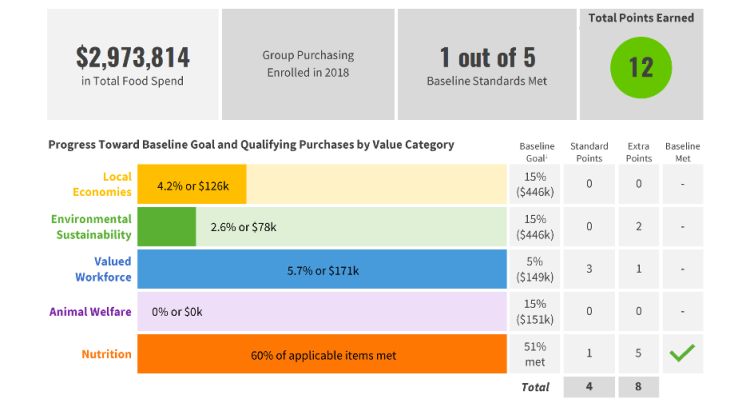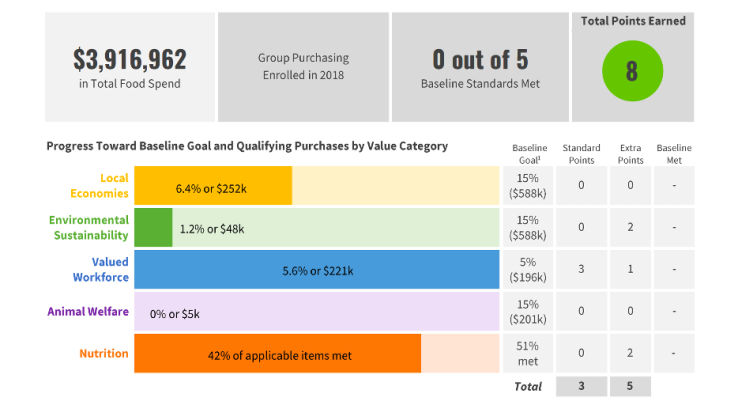Two years after beginning an assessment of their food purchasing practices, the San Francisco Sheriff’s Office and the Department of Public Health will start aligning these practices with standards aimed at improving the environment and the health and well-being of those who eat at the hospitals and jails, as well as those working in the food system.
San Francisco’s jails and public hospitals combined spend nearly $7.5 million on food each year. This move to align food purchasing practices with the Center for Good Food Purchasing program standards is a significant step toward a more just and sustainable food system. SPUR and a coalition of community partners have supported implementing the Good Food Purchasing Policy since 2016.
Laguna Honda Hospital, Zuckerberg San Francisco General Hospital and the Sheriff’s Office began studying their food purchasing patterns at the direction of the San Francisco Board of Supervisors in 2018 in order to establish a baseline understanding of where their food purchasing dollars go. After nearly two years, the baseline assessments are complete, and on August 11, the Board of Supervisors approved an ordinance, introduced by Supervisor Sandra Lee Fewer, specifying how both agencies will improve their food purchasing over the next five years to meet the standards. SPUR submitted public comment in support of the ordinance.
The Good Food Purchasing Program standards, set forth by the Center for Good Food Purchasing, are based on five core values:
- Local economies: Support small and mid-sized agricultural and food processing operations within the local area or region.
- Nutrition: Promote health and well-being by offering generous portions of vegetables, fruit, whole grains and minimally processed foods, while eliminating artificial additives and reducing salt, added sugars, saturated fats and red meat consumption. Improve equity, affordability, accessibility and consumption of high-quality, culturally relevant food in all communities.
- Valued workforce: Provide safe and healthy working conditions and fair compensation for all food chain workers and producers, from production to consumption.
- Environmental sustainability: Source from producers that employ sustainable production systems that reduce or eliminate synthetic pesticides and fertilizers; avoid the use of hormones, routine antibiotics and genetic engineering; conserve soil and water; protect and enhance wildlife habitats and biodiversity; reduce on-farm energy and water consumption, food waste and greenhouse gas emissions; and increase menu options that have lower carbon and water footprints.
- Animal welfare: Provide healthy and humane care for farm animals.
By increasing market demand for good food through large institutional budgets, the Good Food Purchasing Program seeks to shift more food production, processing and distribution to align with these core values. To gain one star and a Good Food Provider seal, an institution must meet the Good Food Purchasing Program minimum baseline in all five categories. Institutions can also earn extra points for actions or purchases that go beyond the basic standards. The standards are metric-based and set up to encourage continual improvement, with higher standards phased in over time.
The Center for Good Food Purchasing will complete annual assessments of each agency's food purchasing and compare it to the baseline assessment to measure their progress toward earning a Good Food Provider seal.
Baseline Assessments: The Agencies’ Current Food Purchasing
The baseline assessments looked at the total each agency spent on food and what percentage of their totals they spent in each of the five core value areas. The Good Food Purchasing Program sets a certain percentage of total food expenditures as a minimum baseline for the agencies to achieve in each core value area. The baseline assessments compared the percentage of the agencies’ actual food spending in each core value area to the minimum baseline percentages and points earned for meeting additional criteria to develop their score. The minimum baseline percentages in each core area are:
- Local economies: 15%
- Environmental sustainability: 15%
- Valued workforce: 5%
- Animal welfare: 15%
- Nutrition: 51%
Laguna Honda Hospital
The baseline assessment shows that the hospital met the minimum baseline in nutrition but has not yet met the goals for the other four categories. Alignment with the nutrition value is based on a 20-item checklist that includes a range of items, from offering free water at all meals to reducing purchases of red and processed meat. Laguna Honda exceeded the minimum baseline, completing 60% of the checklist items. The hospital earned extra points in the environmental sustainability, valued workforce and nutrition categories. Its scores are in the table below.
Laguna Honda Hospital Baseline Assessment, Fiscal Year 2018

Source: Good Food Purchasing Program Laguna Honda Hospital Baseline Assessment
Zuckerberg San Francisco General Hospital
The baseline assessment shows that the hospital has not yet met any of the baseline requirements. However, it earned extra points in the environmental sustainability, valued workforce and nutrition categories.
Zuckerberg San Francisco General Hospital Baseline Assessment, Fiscal Year 2018

Source: Good Food Purchasing Program Zuckerberg San Francisco General Hospital Baseline Assessment
San Francisco Sheriff’s Office
The baseline assessment shows that the jails exceeded the baseline requirement for the local economies category, spending about $121,000 (20%) of its budget on purchases from family- or cooperatively owned farms and processors within 250 miles. The department earned extra points in the valued workforce and nutrition categories.
San Francisco Sheriff’s Office Baseline Assessment, Fiscal Year 2018

Source: Good Food Purchasing Program San Francisco Sheriff’s Department Baseline Assessment
Planned Improvements: Where the Agencies Are Going with Food Procurement
Laguna Honda and Zuckerberg San Francisco General hospitals created a joint plan to improve their food purchasing practices and plan to meet the local economies, valued workforce and nutrition minimum baselines by January 2021. The hospitals’ proposed changes include awarding a contract to a local produce vendor and conducting an analysis of trans fats and whole grains in purchased food. The hospitals plan to meet the minimum baseline for environmental sustainability in January 2022 and for animal welfare in January 2023.
The Sheriff’s Office plans to meet the nutrition baseline by January 2021, followed by environmental sustainability, valued workforce and animal welfare minimum baselines in January 2022. To meet these goals, the jails plan to purchase more whole and minimally processed foods, more food grown without pesticides and more products from animals raised without antibiotics.
The agencies’ plans for improvement mirror those of San Francisco Unified School District, which presented its plan at a SPUR public forum in 2019 and provided a strong example of actionable, attainable and ambitious goals. The Center for Good Food Purchasing provided support to the agencies by identifying possible concrete changes to purchasing and sharing supply chain knowledge. Community groups also informed the institutions’ plans for improvement and acted as subject matter experts across the five value categories. The hospitals and Sheriff’s Office will return to the Board of Supervisors annually to report on their progress, and SPUR will continue to track improvements.
The agencies’ plans put them on track to be certified Good Food Providers by January 2023, and to direct substantially more money toward producers who have better labor practices, make a smaller environmental impact, treat animals better and provide healthier options for consumers while supporting the local economy. The plan for hospitals and jails establishes a strong path forward in securing good food for all.
